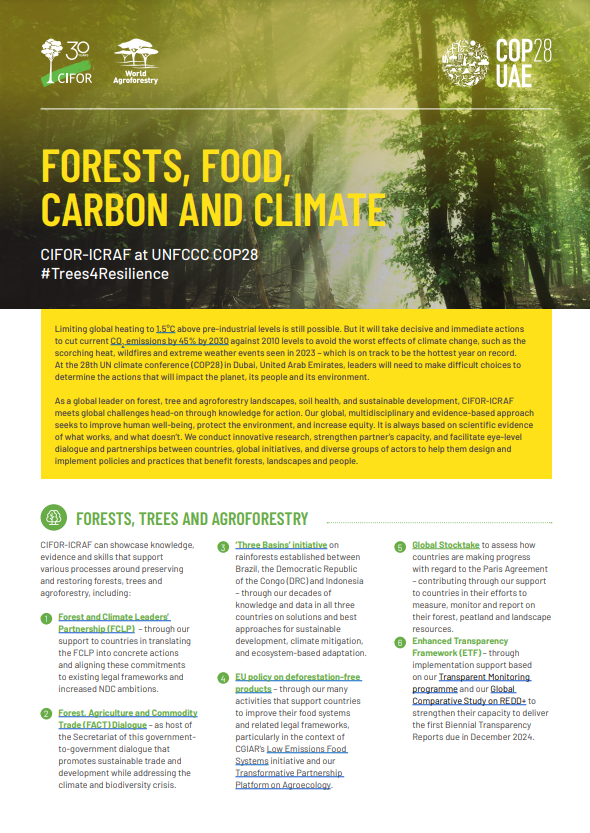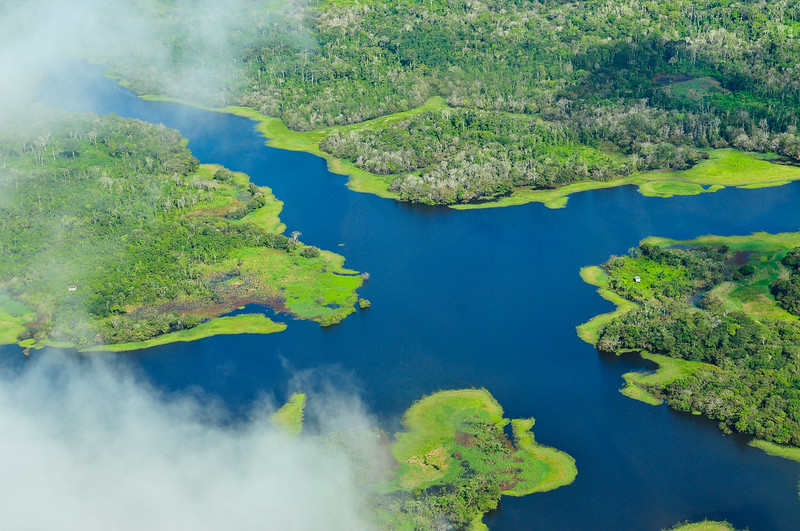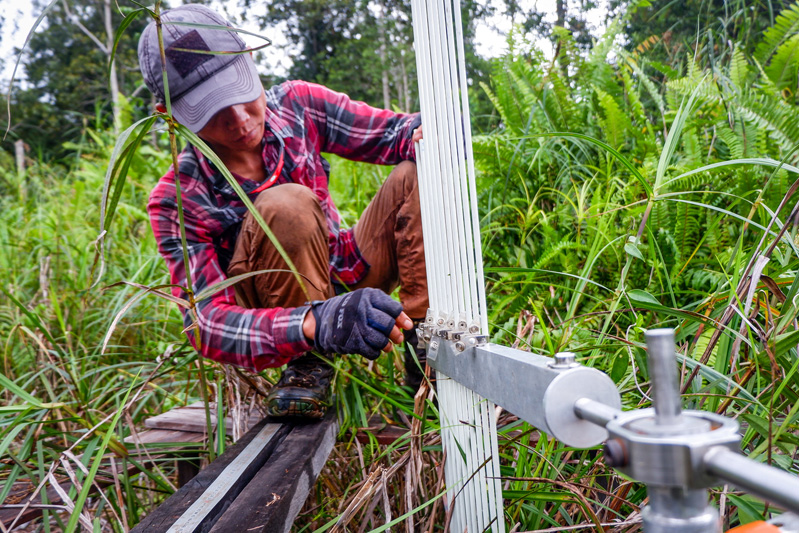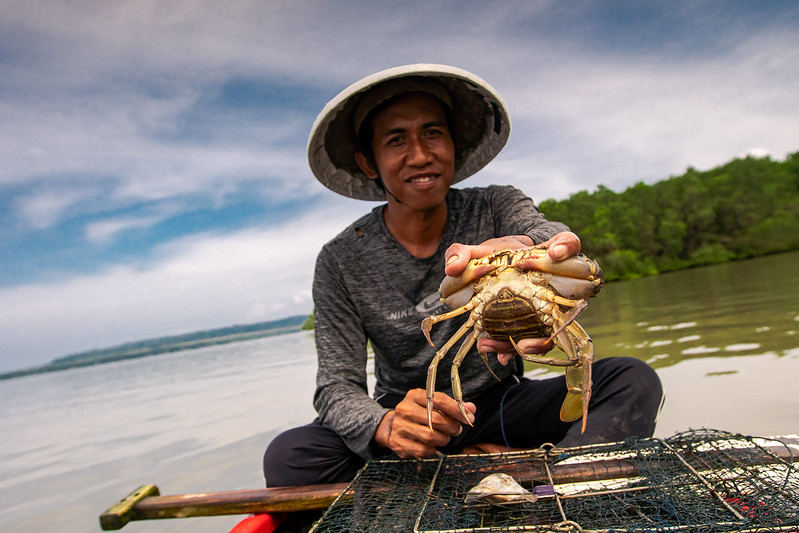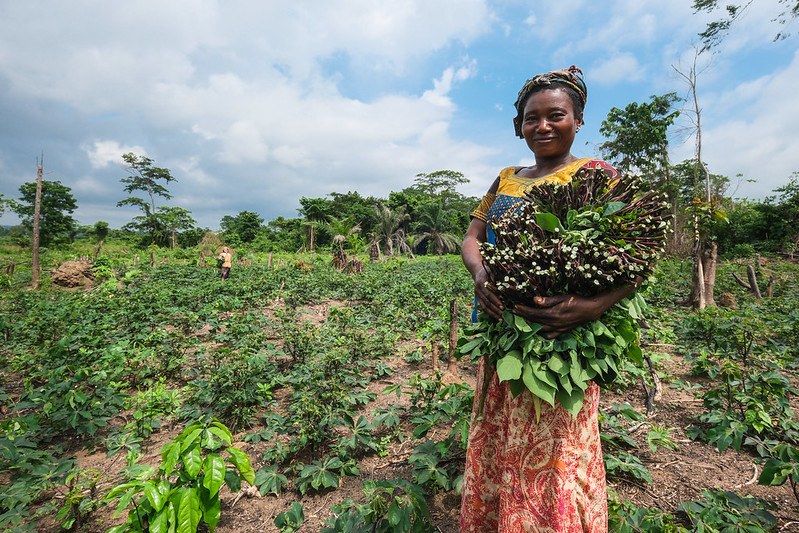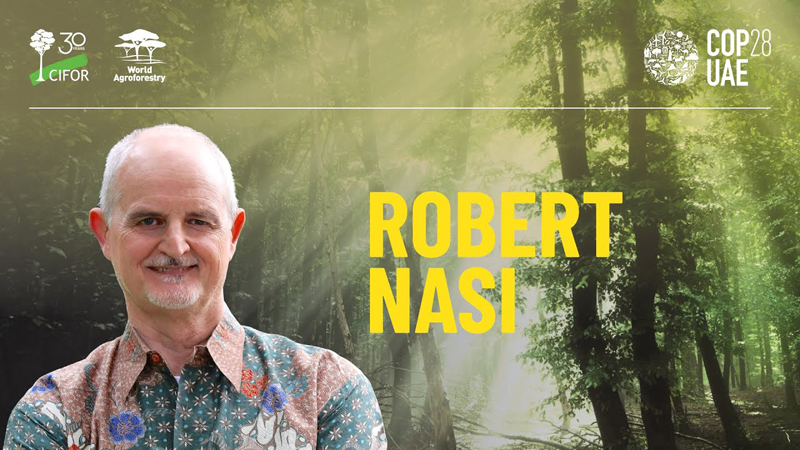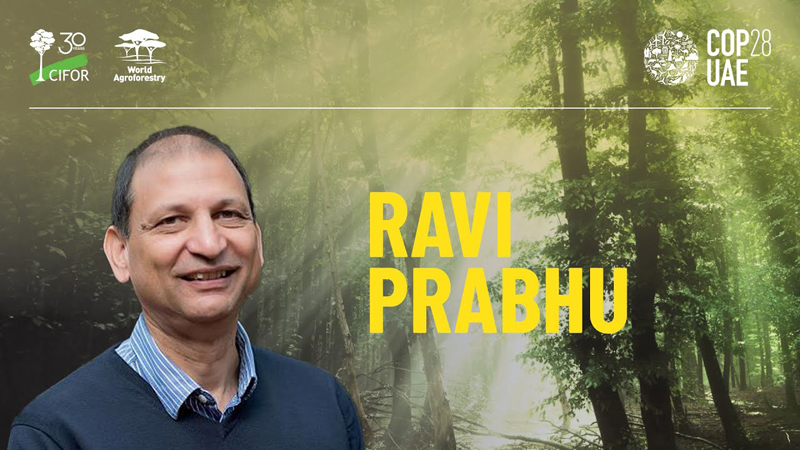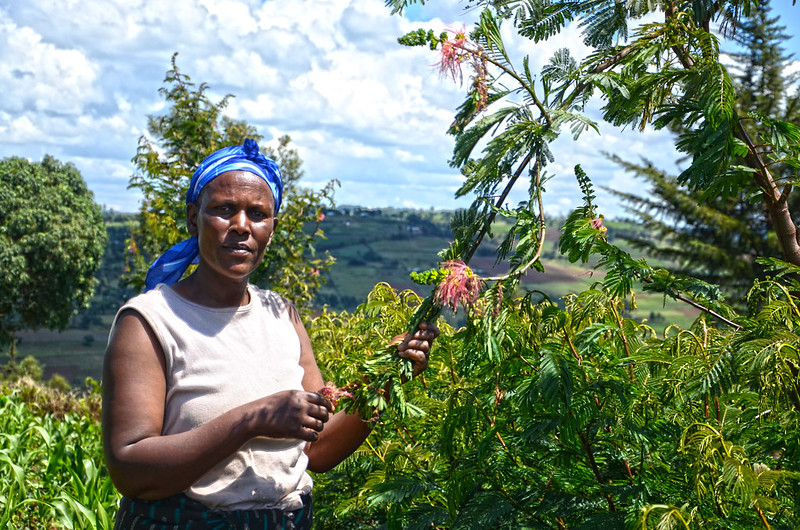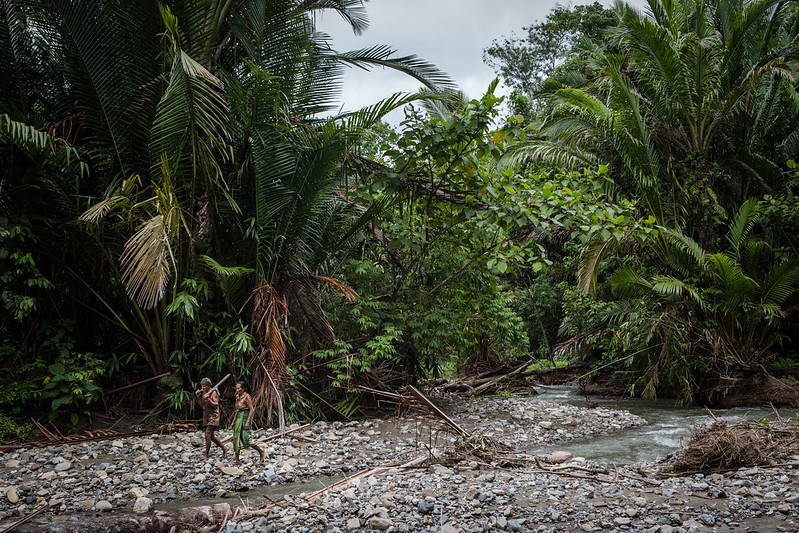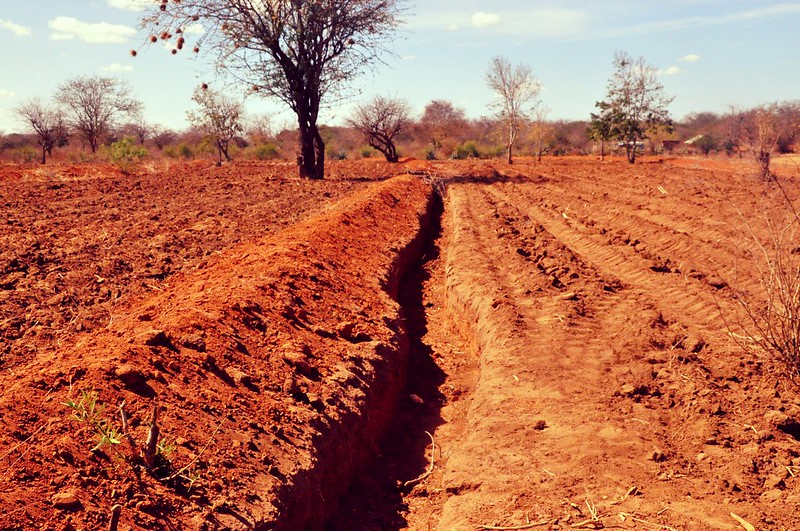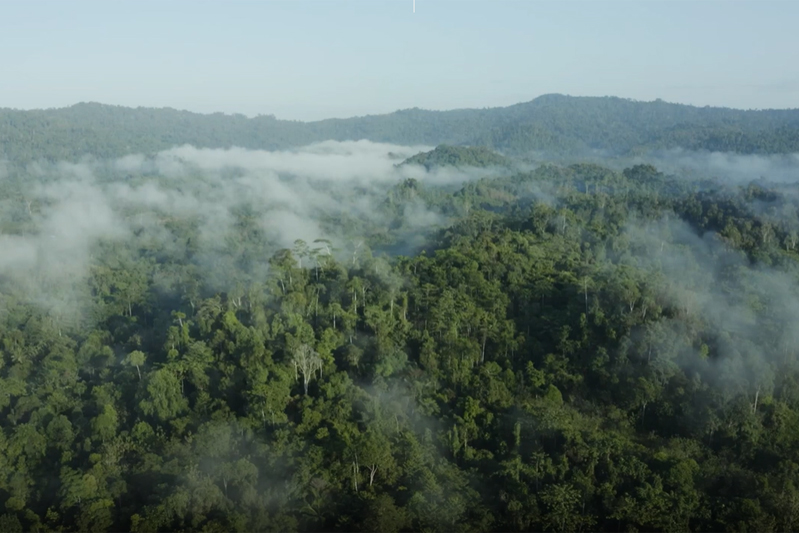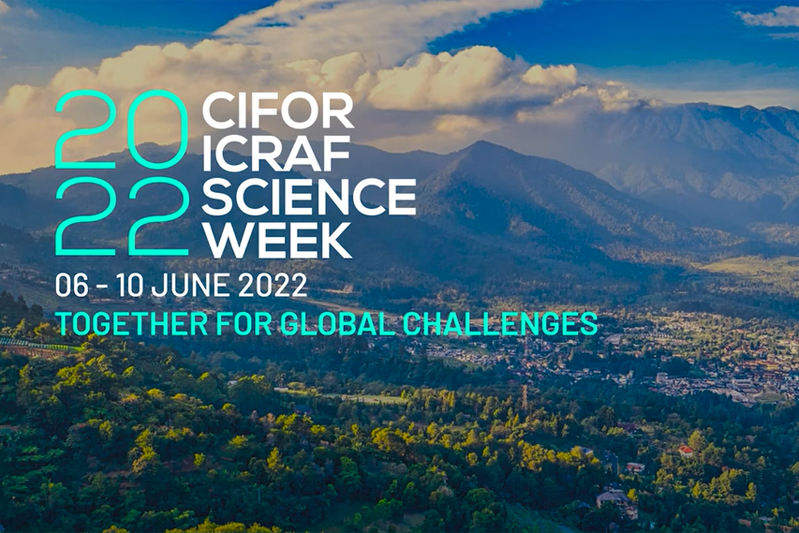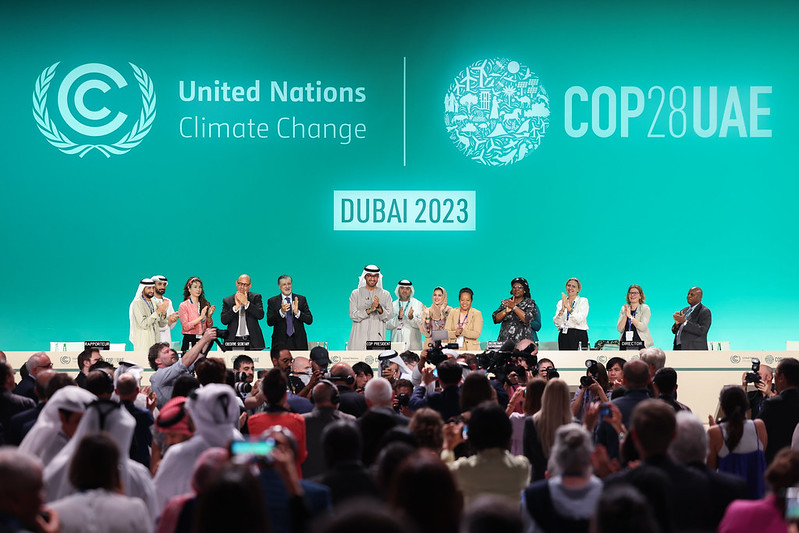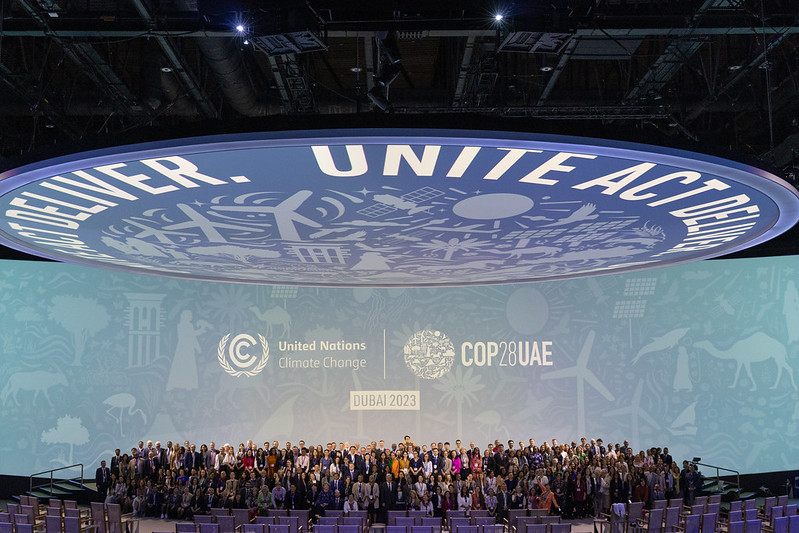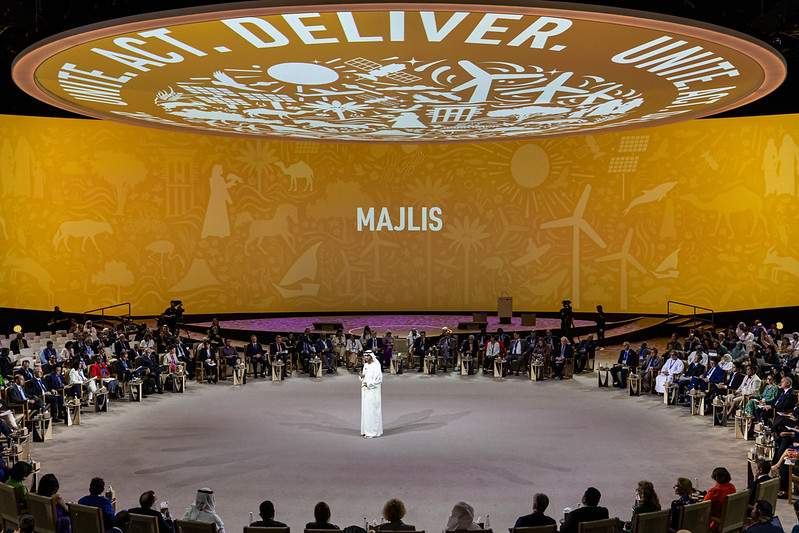
TREES FOR RESILIENCE
CIFOR-ICRAF at UNFCCC COP28
Trees, food, carbon and climate: Connecting the solutions
Choices and actions taken – or not taken – in the next decade will have climate impacts for thousands of years. In the last months of 2023, a year of scorching heat records, the Parties to the United Nations Framework Convention on Climate Change (UNFCCC) will meet in Dubai at COP28 to agree on actions that will determine our planet’s future.
As a global leader on forests, trees, agroforestry and soil health, CIFOR-ICRAF has the evidence and insights people need to make these hard choices. Through eye-level dialogue with all stakeholders, our experts continue to inform policies and practices that benefit forests, landscapes and people.
For media inquiries contact:
Trees,
People,
Planet
Highlights
Our speakers
Hear from our experts
1 Dec
LOCATION
IUCN PavilionThe event will showcase the interlinkages of tree commodities across Africa within different value webs. This will bring into perspective the agronomic, value-addition and governance pathways that currently enable the achievement of sustainable development in Africa. Additionally, the event will highlight discussions on the nexus of restoration and conservation, and economic impact among the African countries.
LOCATION
GASP PavillionThis session will discuss and highlight lessons, challenges and opportunities for enhancing the contributions of agroforestry to achieving NDCs. It will bring together practitioners from the government, research and development, and private sector to share their experiences in agroforestry practices and how the practice can be enhanced further for multiple ecological and livelihood benefits.
This session will discuss and highlight lessons, challenges, and opportunities for enhancing the contributions of forests to achieving NDCs. It will bring together practitioners from the government, research and development, and the private sector to share their experiences in agroforestry practices and how the practice can be enhanced further for multiple ecological and livelihood benefits.
2 Dec
LOCATION
Food Systems PavilionLOCATION
Blue Zone, B7, RM 89, GASP PavilionUsing an ecosystem services perspective, we will explore how trees contribute to adaptation and how this can be used to help in measuring progress to the GGA. Forests and trees play a critical role in food and nutritional security for 1.6 billion smallholders; By providing ecosystem services and products, trees are critical to the successful adaptation of farming systems, households, and landscapes.
LOCATION
Blue Zone, B7, RM 89, GASP PavilionForests, trees and agroforests have been proven to promote food security and ecological and livelihood resilience globally. In this session, we attempt to connect the nexus of trees, food systems, and resilience. This is informed by CIFOR-ICRAF’s work across the globe on the value of trees in enhancing the resilience of food systems, noting that increased degradation of over 40% of the global land affects food security.
LOCATION
Blue Zone, B7, RM 89, GASP PavilionGreen tree commodities represent the fastest-growing land uses in Africa with huge potential to address poverty reduction and promote both ecosystems and livelihood resilience. It is estimated that tree commodities cover 100 million hectares of arable lands and impact over 150 million farmers directly and over 600 million indirectly.
3 Dec
LOCATION
NDC PavilionYouth and Gender are mentioned in three quarters of NDCs but many times it is a throwaway phrase and it doesn’t have any meaningful implementation or money behind it! This event is a call to action for member states to pick up these and other neglected opportunities to transform Food Systems. The panel will also explore entry points for local actors to ensure their role in the practical operationalization of NDCs.
Moving forward climate finance: ASEAN investment framework for haze-free sustainable land management
LOCATION
Malaysia Pavilion, Blue ZoneWith approximately 40% of the global tropical peatlands located in Southeast Asia, there is a crucial need to reduce the impact of drained peatlands, often resulting fires, large amounts of GHG emissions, and transboundary haze in the region. Over the last 25 years, hundreds of billions of economic damages have been done at immense social costs and environmental impacts. This event will forefront a discussion on the need for investing in a haze-free ASEAN. Three experts will weigh in on topics such as the ASEAN Haze-Free Roadmap, ASEAN Investment Framework for Haze-Free Sustainable Land Management, investing in sustainable land management and the pivotal role of commercial bank finance in fostering a sustainable future.
There is tremendous value to be realized from the adoption of regenerative and forest positive agriculture that are resilient to the impact of climate change whilst simultaneously offering opportunities to sequester carbon in soils and biomass, produce co-products and services and improve the long-term productivity of forests and fields. As policy-makers around the World increasingly recognize hidden benefits and costs of business activities, they are enacting policy to price these in through mechanisms such as regulation, carbon taxes, trading.
4 Dec
LOCATION
Burkina Faso Pavilion, Blue ZoneLOCATION
ZONE B7, Building 89, Pavilion TA2-125, Food & Health BuildingLOCATION
SE Room 6LOCATION
Indonesian Pavilion, Blue Zone AreaThis session will focus on difficulties related to tropical mangrove conservation, restoration, and management by presenting Indonesia’s primary initiatives and implementation strategies aimed at enhancing mangrove ecosystem resilience and social and economic advantages to coastal communities while simultaneously contributing to national and global commitments. It will further explore the blue carbon investments, women’s empowerment in mangrove protection and restoration. It will be wrapped up with policy suggestions to foster cooperation and partnerships in the management of sustainable mangrove ecosystems.
LOCATION
IUCN Pavilion, Ground-floor, Thematic building 4 (TA4.135), Blue Zone5 Dec
LOCATION
Food Systems Pavilion, Expo City, Dubai, UAELOCATION
Food Systems PavilionHealthy soil is the very foundation of our food systems and provides several vital ecosystem services, from carbon sequestration to improving food and nutrition security. Efforts to combat desertification, to move from scarcity to prosperity, will need to consider how to scale soil health, globally. With over one third of the Earth’s surface degraded and over 3.2 billion people negatively affected by degradation, continuing business as usual is no longer an option.
LOCATION
SE Room 9The multiple crises facing the world, including deforestation and biodiversity loss, climate change, broken food systems, unsustainable value and supply chains, and extreme inequalities, have put agroforestry on the top of most consensus lists of how to successfully combat multiple in cost-effectively and in an integrated way.
6 Dec
LOCATION
FSP PavilionLOCATION
GAUC pavilion, Blue Zone, TA1-140The Global Commons, stable and resilient earth system, are increasingly at risk, and actions are needed now. Global Commons Stewardship Index (GCSI), jointly developed by Center for Global Commons (CGC) at The University of Tokyo, Yale University and SDSN, provides information on environmental stress incurred by 150 counties and emphasizes how unsustainable production systems – but also unsustainable consumption in high-income countries – drive negative impacts on the Global Commons. Taking advantage of the latest advances in trade data, environmental research, and industrial ecology, the GCSI provides detailed analyses of impacts embodied in international trade flows. The G20 presidencies of Brazil (2024) and South Africa (2025) can provide momentum for concerted global actions and further efforts to reduce negative impacts on the Global Commons.
LOCATION
Nature Pavilion, Blue Zone, Expo City, Dubai, UAELOCATION
GASP Pavilion, Blue ZoneHealthy soil is the very foundation of our food systems and provides several vital ecosystem services, from carbon sequestration to improving food and nutrition security. Efforts to combat desertification, to move from scarcity to prosperity, will need to consider how to scale soil health, globally.
Beyond tree planting: Strengthening the multifaceted dimensions of ecosystem restoration in Cameroon
LOCATION
COMIFAC Initiatives PavilionCameroon, like many other countries, is actively involved in ecosystem restoration. As part of the broader Bonn Challenge, which has been implemented in Africa as AFR 100, Cameroon has made a commitment to restore 12 million hectares of land. However, transforming this commitment into reality requires the mobilization of various efforts from different sources, including academic institutions and practitioners of tree planting. In Cameroon, there are numerous tree-planting initiatives aimed at restoring degraded ecosystems such as forests, mangroves, etc.
8 Dec
LOCATION
GASP (Global Alliance for a Sustainable Planet) PavilionLOCATION
Expo City, Blue Zone, EU PavilionThis event will allow to delve deeper into some of these aspects. A first section of keynotes will seek to draw the connections between sustainable land management and climate change from a set of different perspectives. The following expert panel will then dive deeper and provide insights into the technical aspects of harnessing the synergies between action on land and climate.
LOCATION
COMIFAC Initiatives PavilionLOCATION
COMIFAC Initiatives Pavilion, Blue Zone9 Dec
LOCATION
Land and Drought Resilience Pavilion, Blue ZoneHealthy soils are the foundation of sustainable and regenerative food systems and provide several vital ecosystem services. Sequestering carbon in soils, for example, can have multiple benefits for climate change mitigation and adaptation, food and nutrition security, biodiversity, and water resilience. However, there are few policies that incentivize farmers to invest in practices to improve soil health. This session will build on a set of policy briefs produced in December 2022 from Ethiopia, Kenya, Ghana, Mali, Senegal and Zambia that highlight opportunities for the inclusion of soil health and soil organic carbon (SOC) into the Nationally Determined Contributions (NDCs).
LOCATION
Thailand Pavilion, Blue ZoneTransboundary haze has been a longstanding environmental challenge in Southeast Asia, spanning over three decades. Its impact extends not only to regional countries but also beyond, affecting human health, the economy, agriculture, the environment, and biodiversity. This event aims to initiate a dialogue on the imperative for investment and action towards achieving a haze-free ASEAN. Four experts will delve into key subjects such as the ASEAN Haze-Free Roadmap, the ASEAN Investment Framework for Haze-Free Sustainable Land Management, the Tripartite Clean Air Strategy initiative, and the crucial role of communities in addressing fire and haze issues.
LOCATION
GASP Pavilion, Blue Zone, B7, building 89LOCATION
COMIFAC Initiatives PavilionLOCATION
Women’s Pavilion Majlis, Green ZoneThis high-level panel will convene global partners, including ministers, non-state actors, international organizations, and Indigenous Peoples and Local Communities, to assess progress on the restoration and conservation of terrestrial ecosystems. Participants will announce their deliverables achieved in the past year and release actionable plans and commitments for the upcoming year and beyond, highlighting the power of multi-stakeholder partnerships in driving real-world change and delivery towards global goals and commitments on land restoration, including the G20 Land Initiative’s 2040 goal to halt land degradation by 2040, the Nature-Based Solutions 2030 Breakthrough target, and the Glasgow Leaders’ Declaration on Forests and Land-Use (GLD).
LOCATION
UNEP PavilionFrom lowering temperatures to providing renewable materials, livelihoods and employment, the world’s forests play a larger role than just cutting carbon emissions to combat climate change. Despite enormous untapped potential that all types of forests hold, much of attention in climate policy, including climate finance, has to date focused on potential of forests in carbon storage and removal, particularly in the tropics.
LOCATION
German PavilionThe side event will shed light on the interface between nature-based solutions for climate and biodiversity and circular economy and the central role of how biomass is used. It will focus on the current policy framework for biomass use and the implications for the implementation of nature-based solutions for climate and biodiversity. It will draw attention to current policy challenges at this interface as well as to Germany’s activities in both areas.
10 Dec
LOCATION
Viet Nam’s Pavilion and onlineThis side event is a response to this context, allowing Viet Nam to share experience, knowledge and discuss solutions to address the above-mentioned challenges. It will also provide recommendations for policy makers to promote the inclusion of coastal and marine ecosystems as part of national mitigation and adaptation goals.
LOCATION
Finnish pavilionWhat is needed to support systemic change in food production and consumption? We bring together diverse actors to present intriguing hands-on solutions and best practices for building more sustainable and climate-resilient food systems. Our speakers include policy-makers, scientists, and young farmers.
LOCATION
UK PavillionThis interactive event will build on the FACT Dialogue to support sustainable trade whilst protecting people, forests and ecosystems. The event will launch the 2023 FACT Dialogue Progress Report and provide a dynamic space for ‘mini dialogues’ with FACT members inviting wider stakeholders to hear about and feed in on what governments have been discussing within the initiative.
LOCATION
Indian PavilionThis session will dive into a conversation about measuring and validating farmland health which is not an easy process for many farmers. When investors and carbon credit buyers expect professional verifications, this process can be costly and time consuming. Improvements in remote sensing technology may be able to empower farmers’ agency – but how long before the technology is trustable by investors?
LOCATION
SE Room 1LOCATION
Benelux PavilionThis session presents a hopeful perspective of a climate resilient and nature-based future for Europe in 2120 with a focus on the potential of nature-based solutions as an essential part of a cohesive, collaborative approach towards the development of a climate resilient and nature-based future for Europe.
High-level Dialogue of the Collaborative Partnership on Forests
Forests for our common future: Halting and reversing deforestation by 2030
LOCATION
Action Arena 1 (Al Hur)Despite their critical roles in sustaining people’s health and livelihoods, regulating climate, and harboring biodiversity, the global forest area continues to shrink. Since 1990, an estimated 420 million hectares of forests have been lost worldwide. Annually, an estimated 10 million hectares worldwide have been deforested from 2015 to 2020.
LOCATION
HybridOne of the main challenges in the fight against climate change is to mobilise science and scientists to tackle this global problem. Within the framework of the UNFCCC (United Nations Framework Convention on Climate Change), structures such as the IPCC (Intergovernmental Panel on Climate Change) play a crucial role in providing the knowledge needed to better understand climate dynamics and the measures associated with them.
LOCATION
Denmark Pavilion, Blue ZoneThis session brings together diverse perspectives to explore the intersection of science, technology, finance, and carbon policies and standards in driving the transition to regenerative agriculture among farmers. Featuring short presentations from private market leaders, scientific experts, international carbon standard representatives, and a pioneering regenerative farmer, attendees will gain insights into the innovative strategies and opportunities for turning agricultural soils into carbon sinks.
11 Dec
LOCATION
IUCN Pavilion – HybridLOCATION
Hybrid12 Dec
LOCATION
Sri Lanka PavilionLOCATION
OnlineThis session seeks to explore the food trade risks compounding with the climate crises and conflicts around the world. We will look at the current dynamics of the global food trade, interconnected food markets, and the risk that climate change, environmental degradation, economic change, and political instability pose to our food supplies.











